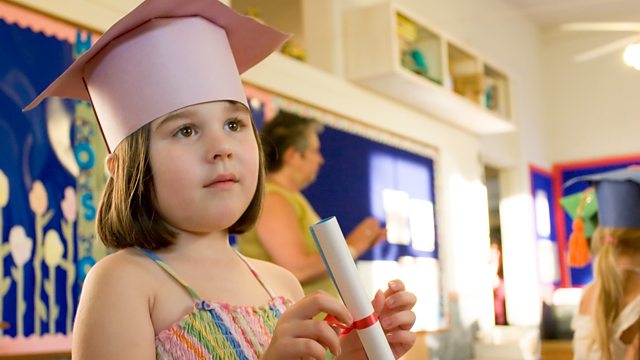Weekend Woman's Hour
School's out - high emotion when primary school ends. Plus, women in Britpop and attitudes to women who wear the burka. Presented by Jane Garvey.
The end of the summer term is fast approaching and for children leaving primary school, it can come with a stretch limo, a Prom, a commemorative DVD, and a lot of high emotion. But is that a good thing for the kids? Author Yasmina Reza discusses her new book about relationships, philandering and the differences between the French and the English. Warsan Shire, the first Young Poet Laureate for London, performs her work and talks about what inspired it. Are attacks on Muslim women linked to wearing the burka? We hear from two women on reaction they're experienced when wearing the veil. With the European Union high on the news agenda, we debate what it's achieved for women. After the death of Nadine Gordimer, Nobel Prize winning author and activist, there's a chance to hear a Woman's Hour archive interview, recorded in 2002. Brit Pop was at its height twenty years ago, defined by boys with guitars but what was it like for the few women involved?
Last on
Clip
-
![]()
Nadine Gordimer
Duration: 11:04
Yasmina Reza
Yasmina Reza, best known for her plays 'Art' and 'God of Carnage', has a new book out. 'Happy are the Happy' is a novel about eighteen different people, each chapter narrated by a different character.Ìý Cumulatively they reveal secret passions, many disappointments and a strong propensity for infidelity. Yasmina Reza joins Jane to talk about relationships, philandering and the perception of difference - right or wrong -Ìý between the French and the English.
'Happy are the Happy' by Yasmina Reza Ìýis published by Harvill Secker.
Leaving Primary School
Warsan Shire
Last OctoberÌýWarsan Shire was announced as the first ever Young Poet Laureate for London by Carol Ann Duffy at the Houses of Parliament. She has spent the last 9 months creating work that reflects the ever-changing city, and giving readings around Britain and internationally. The Kenyan-born Somali poet first came to notice when her poem "For Women Who Are Difficult to Love" went viral in 2009.ÌýThe Young Poet Laureate competition is launching again this week as part of, a poetry and spoken word programme commissioned by the London Legacy Development Corporation to promote poetry in East London. Warsan joins Jenni to talk about the inspiration for her poems and to do a live performance.
Ìý
Islamophobia and the Veil
The ban on the burka in France has been upheld by the European Court of Human Rights.Ìý And, attacks on Muslim women wearing the veil in the UK are reported to be on the increase. Does traditional dress put women at risk? Would a UK ban protect women and reduce Islamophobic attacks? The criminologist Dr Irene Zempi has spoken to women who wear the veil in Leicester.ÌýShalina LittÌýis Muslim and wears a full veil on the streets of Birmingham. They both join Jane to discuss UK attitudes to the burka.
'Islamophobia, Victimisation and the Veil’ by Irene Zempi and Neil Chakraborti is published Palgrave Macmillan.Ìý
Europe - what has the EU done for women?
South African Novel Prize Winning Nadine Gordimer
The writer, who was one of the literary world's most powerful voices against apartheid - died at her home after a short illness, her family said.
She wrote more than 30 books, including the novels My Son's Story, Burger's Daughter and July's People.
She jointly won 1974's Booker Prize for The Conservationist and was awarded the Nobel Prize for literature in 1991.
In 2002 Nadine came onto to Woman’s Hour to talk to Jenni Murray.Ìý
Women and Britpop
20 years ago marked the height of Britpop – of bands like Blur, Oasis, Suede, Pulp, Elastica, Sleeper, and Echobelly. Blur releasedÌýthe album Parklife,Ìýand Oasis put outÌýDefinitely Maybe, and the two later battled head-to-head in a media-stoked chart battle, dubbed "The Battle of Britpop." It was scene concerned with British working class values, and a cocky maleness that went hand-in-hand with the rising lad culture of the era. But in a musical movement defined by boys with guitars, where were all the female musicians? And what did this ‘laddishness’ mean for women? Jenni is joined by Sonya Madan of Echobelly, and by Jo Whiley, whose Radio 1 show in the nineties, The Evening Session, celebrated the Britpop scene.
TheÌýnew album Britpop At The Â鶹ԼÅÄ is out this week on Warner, and Echobelly re-release their first two albums next week, on 23 July
Credits
| Role | Contributor |
|---|---|
| Presenter | Jane Garvey |
| Interviewed Guest | Yasmina Reza |
| Performer | Warsan Shire |
| Producer | Rabeka Nurmahomed |
| Editor | Anne Peacock |
Broadcast
- Sat 19 Jul 2014 16:00Â鶹ԼÅÄ Radio 4 FM
Follow us on Instagram
Get all the pictures, videos, behind the scenes and more from Woman’s Hour
Podcast
-
![]()
Woman's Hour
Women's voices and women's lives - topical conversations to inform, challenge and inspire.



